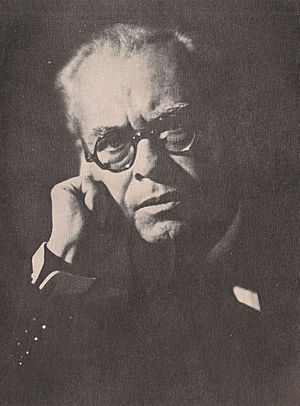Joan Lamote de Grignon facts for kids
Joan Lamote de Grignon i Bocquet (born 7 July 1872 – died 11 March 1949) was a talented Spanish musician from Catalonia. He was a skilled pianist, a creative composer, and a director who led many orchestras.
Life of a Musician
Joan Lamote de Grignon was born and passed away in Barcelona. His parents, Lluis Lamote de Grignon and Elena Bocquet, were of French background. He learned music from a famous teacher named Felip Pedrell in Barcelona.
In 1911, Joan Lamote de Grignon started the Barcelona Symphony Orchestra. He was also its first music director. He even had the chance to direct the famous Berlin Philharmonic Orchestra.
In 1914, he became the director of the Municipal Band of Barcelona. He helped many young musicians there. He also made sure the band played a wide range of well-known music. Three years later, he became the director of the music school at the Gran Teatre del Liceu in Barcelona.
Later, in 1943, he founded the Valencia Municipal Orchestra. He led this orchestra until 1949, the year he died.
Family and Legacy
Joan Lamote de Grignon wrote about 150 songs. He also created larger musical works like an oratorio called La nit de Nadal (Christmas Night) and a lyric drama named Hespèria. He composed symphonies, religious music, and pieces for piano.
He also wrote several sardanes for a special Catalan band called a cobla. He even helped start a cobla band called Cobla Barcelona.
His son, Ricard Lamote de Grignon, followed in his footsteps. Ricard also became a composer and orchestra director. He worked with his father as an assistant director for the Valencia Municipal Orchestra.
The musical works and papers of the Lamote de Grignon family are kept safe. You can find them at the Generalitat of Catalunya's document center. They can also be studied at the Biblioteca de Catalunya.
Joan Lamote de Grignon died in 1949. He was buried in the Sant Gervasi Cemetery in Barcelona.
His Music
Joan Lamote de Grignon's compositions include around 150 songs. He wrote an oratorio, which is a large musical piece for voices and orchestra, called La nit de Nadal (Christmas Night) in 1906. He also created a lyric drama, Hespèria, in 1907.
His works also include:
- A set of three symphonic pieces.
- One full symphony.
- A Mass (religious music) for two voices and organ.
- Motets and other spiritual songs.
- Music for orchestra with singers.
- Lieder (German songs) and other songs.
- Music for plays.
- Pieces for voice and piano.
- Music for bands.
Sardanes
He wrote several sardanes for a cobla band. Sardanes are a traditional Catalan folk dance.
- Solidaritat de flors (1907)
- La Rosa del folló (1908)
- El Testament de n'Amèlia (1909)
- His last sardana was Florida (1916). This piece was special because it was written for a cobla and a men's choir from the Orfeó Gracienc in Barcelona.
Recordings
- Songs of Joan and Ricard Lamote de Grignon
See also
 In Spanish: Joan Lamote de Grignon para niños
In Spanish: Joan Lamote de Grignon para niños
 | Sharif Bey |
 | Hale Woodruff |
 | Richmond Barthé |
 | Purvis Young |



